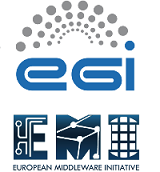Speaker
Overview
Although the capacity and technical advancement of computiational resources
offered by the European computing centres is constantly improving, the
progress in development of high-level tools facilitating access to those
resources is still slow. In this paper, we present our approach to such
high-level, customized environment, called InSilicoLab - designed especially
for chemists who want to use Grid Infrastructure.
Impact
Computational Chemistry is one of the three science domains that utilise
grid resources most - along with High Energy Physics and Biology. While many
computing centres offer a variety of scientific packages for chemists, the
use of these software suites is hindered by the lack of intuitive interfaces
to them.
InSilicoLab, not only provides the users from the Computational Chemistry
domain with easy access to Grid by the means of job management, but, more
importantly, supports scientific experiment planning and evolution. While
the first functionality is already offered by grid portals [1], and some
aspects of the latter are covered by specialised tools invented for
Computational Chemistry (like WebMO [2] or ECCE [3]), only expensive
commercial User Interfaces (like Accelrys Material Studio [4]) join these
features. Still, these proprietary tools are mostly desktop applications -
what makes them inaccessible from outside a local computer and hinders
collaboration.
Description of the work
InSilicoLab is a Web portal for the scientists from the Computational
Chemistry domain who want to take advantage of Grid Resources. The portal
allows them to create and manage scientific experiments and their results
using terms specific to their domain of science.
The multi-layer architecture of InSilicoLab supports this domain-specific
interaction by introducing a “scientific” layer, responsible for
communication with the users, while a separate layer is reserved for
communication with computational and storage resources. These two layers are
interconnected via a third - intermediate - layer, which processes and
translates the objects and methods defined by the user to parallel grid jobs
and/or calls to other services and tools required by the user. This
separation of the domain- and grid-specific layers and concepts related to
them makes the InSilicoLab portal more intuitive to users, enabling them to
focus on their work instead of on the technical details of configuring the
computation, and, thus, making their work more efficient.
Conclusions
The InSilicoLab portal facilitates in-silico experiments performed with help
of the most popular Computational Chemistry packages - Gaussian [5], GAMESS
[6] and Turbomole [7]. The tool is available to any user with a valid Grid
certificate registered in Gaussian VO [8] or vo.plgrid.pl (a Virtual
Organization maintained by the Polish NGI - PL-Grid [9]). It can be accessed
at http://insilicolab.grid.cyfronet.pl.
References:
1. Zhongwu Zhou, Feng Wang, Billy D. Todd: Development of Chemistry
Portal for Grid-enabled Molecular Science, Proceedings of the First
International Conference on e-Science and Grid Computing, pp: 48 – 55, 2005
2. http://www.webmo.net
3. http://ecce.pnl.gov
4. http://accelrys.com/products/materials-studio/index.html
5. http://www.gaussian.com
6. http://www.msg.ameslab.gov/GAMESS
7. http://www.cosmologic.de
8. http://egee.grid.cyfronet.pl/Applications/gaussian-vo/
9. http://www.plgrid.pl/
URL
https://insilicolab.grid.cyfronet.pl

